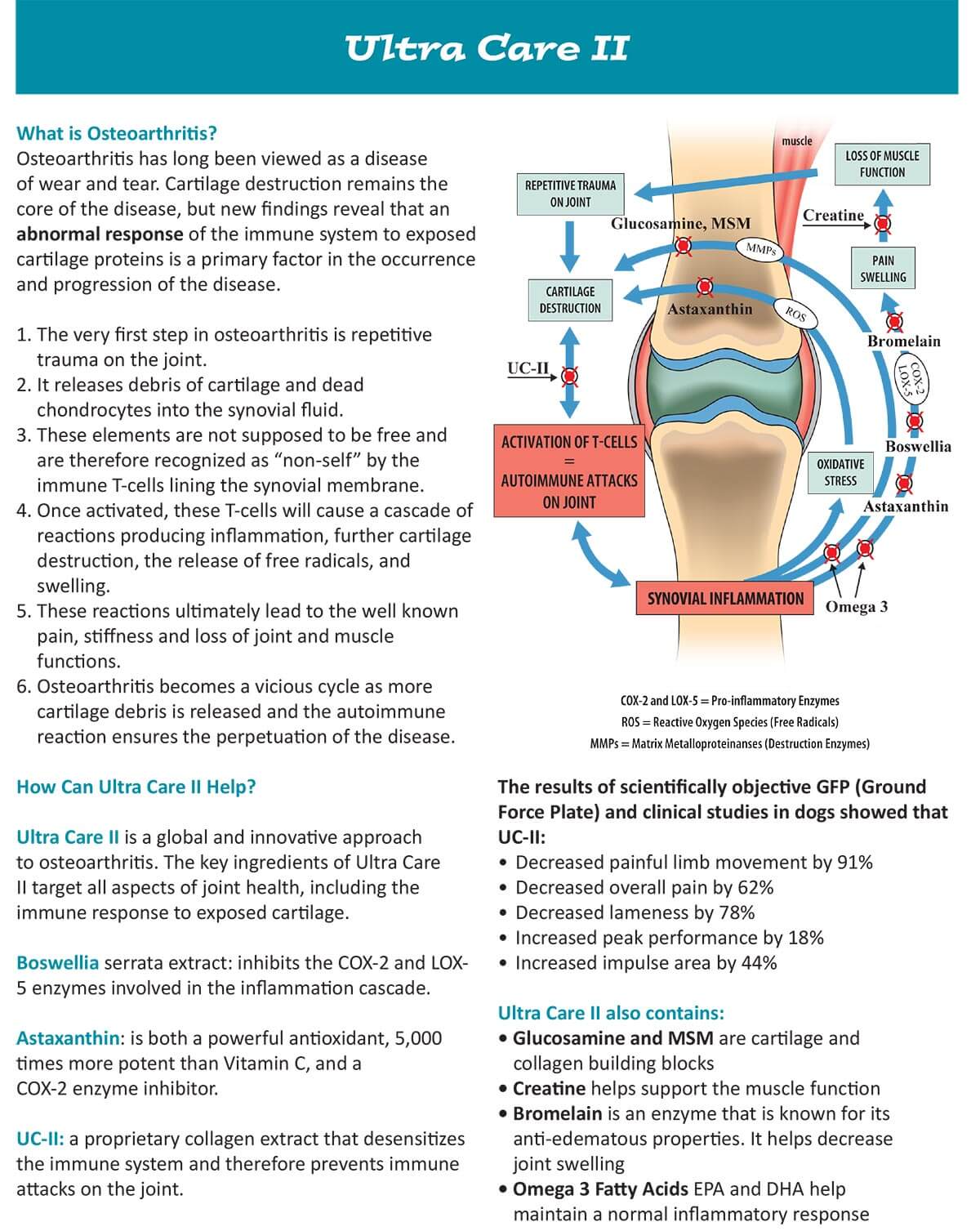Pain Management and Healing
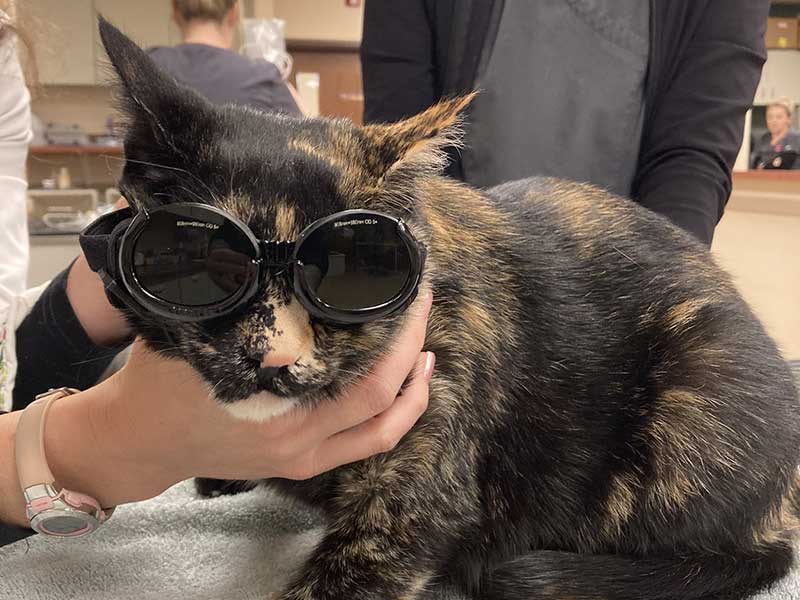
It can be hard to tell if your pet is in pain, since they can’t simply speak and tell us what’s wrong. The veterinarians and staff at Dupont Veterinary Clinic are experienced at recognizing pain in pets. Together with pet parents, we can come up with a treatment plan to help your pet feel better and continue to live as pain-free as possible.
We utilize many different pain management techniques. Learn more about our pain management services and what may cause pain for your pets below.
Platelet-Rich Plasma: A Regenerative Therapy
If you’re looking for a way to treat your pet’s injuries, inflammation, and pain without depending only on medications, platelet-rich plasma (PRT) therapy is a safe and effective option.

What is Platelet-Rich Plasma?
Also called PRP, platelet-rich plasma is a type of therapy that uses a patient’s own platelets to provide pain relief and help heal injuries. Platelets are blood cells that play a significant role in clotting, which helps pets stop bleeding when they get hurt.
That’s not the only role platelets play. They also contain growth factors that help cells grow and divide, providing relief from pain and helping new tissues grow. At Dupont Veterinary Clinic, we offer PRP injections to help treat:
- Pain and inflammation
- Muscle, tendon, and ligament tears
- Osteoarthritis
- Platelet-rich plasma can be an excellent alternative to surgical procedures and the chronic use of pain medications.
How Does Platelet-Rich Plasma Therapy Work?
Platelet-rich plasma therapy works by infusing platelets into an area that needs healing, mimicking the body’s natural response to an injury—but with a little more oomph. PRP contains a platelet concentration that’s 3-to-7 times higher than it is in regular blood. Best of all, the procedure is safe and effective because PRP uses the patient’s own blood.
The platelet infusion means that your pet’s problematic area gets an influx of growth factors—the hormones and proteins that stimulate cell and tissue growth. This can help shorten the time it takes for your pet’s body to heal from injuries. It can also reduce inflammation, chronic pain, and symptoms of arthritis.

PRP Process for Pets
To obtain platelet-rich plasma, our veterinary team will draw your pet’s blood. We put the blood sample through a special centrifugal machine designed for veterinary use. This process produces a platelet-rich plasma mixture, which the veterinary team will carefully inject into the affected area.
Depending on the injection site, your pet may need sedation for this procedure. Your veterinarian will consult with you to decide whether or not your pet needs sedation.
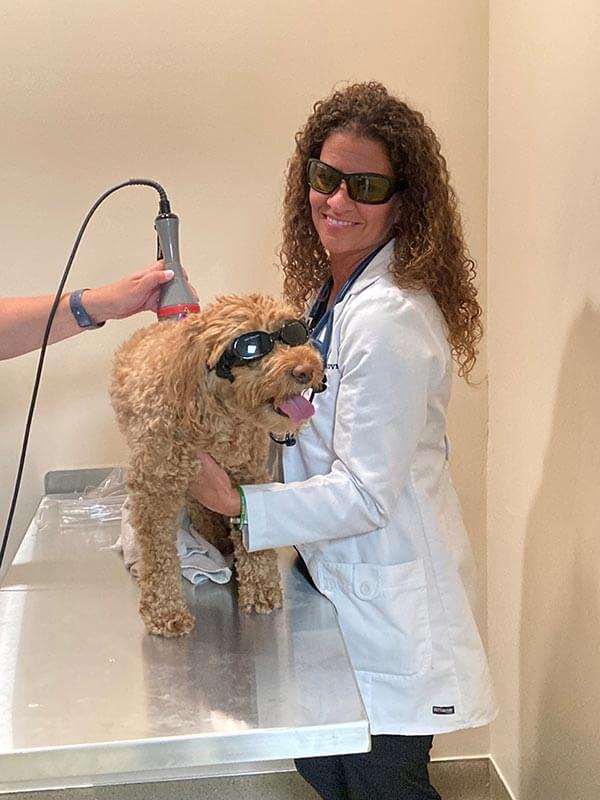
Laser Therapy: Painless Healing for Our Patients
Veterinary laser therapy is a cutting-edge, non-invasive treatment that utilizes the power of light to promote natural healing in pets. This painless, drug-free therapy is a safe and effective way to manage a variety of conditions, including post-surgery pain, arthritis, skin wounds, and more. Applying a precise and gentle laser light to the affected area stimulates cell regeneration and increases blood flow. This helps to reduce pain and inflammation, and promotes faster healing.
For your furry family member, it means shorter recovery times, reduced discomfort, and an enhanced quality of life. Veterinary Laser Therapy offers a holistic and compassionate approach to pain management, allowing your pet to enjoy a happier, healthier life. Call for more information today.
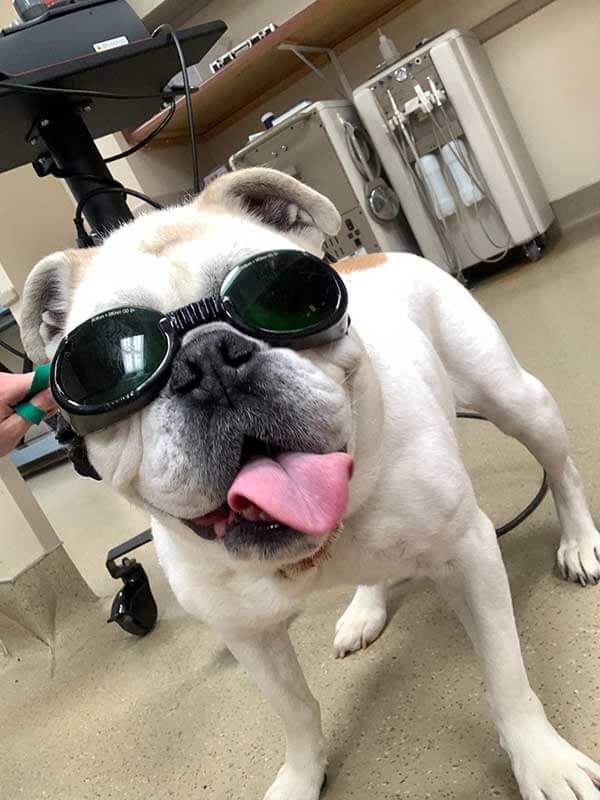
Effective Treatments for Pet Arthritis can Ease Pain
Arthritis is a complex condition involving inflammation of the joints. There are many causes and types of arthritis in pets, although osteoarthritis (OA) or degenerative joint disease (DJD) are by far the most common. In many cases, the degree of arthritis is related to the age of the animal. In other cases, excessive wear and tear of a joint or poor conformation predispose a dog or cat to arthritis.
How Do We Treat Osteoarthritis?
Librela and Solensia Injections
Librela and Solensia are monthly injectable treatments offered to dogs and cats to help treat osteoarthritis. Librela is for our canine patients, and Solensia is for felines. These injectables help to alleviate pain associated with osteoarthritis with effects that last up to 30 days. Both treatments are monoclonal antibody therapies that are administered to target the nerve growth factor (NGF).
Weight Control: Extra Weight Is Hard On Painful Joints
While weight alone doesn’t cause arthritis, excessive weight can make arthritis and the associated pain worse. Over half of the dogs we see are overweight to some degree.
Talk to us about the ideal weight for your pet. As a very general rule, an average dog should eat about 1 cup of dry food for each 20 pounds of body weight per day. This amount should be based on your dog’s ideal body weight. If you have trouble achieving ideal weight, we can discuss alternatives to help you. One very helpful diet is a prescription diet available through veterinarians called Metabolic by Hill’s Science diet.
Exercise: Moderate Exercise Aids Mobility And Joint Function
Exercise is important to control your pet’s arthritis. Obviously the degree of arthritis and other health issues can play a role in what amount of exercise your pet can tolerate. Think of your pet’s joint as a hinge—too little use can cause it to rust or freeze up, whereas too much use can wear it out. As a rule, moderate and controlled exercise is best. Avoid jumping, roughhousing, or chasing Frisbees with your pet. Leash walks and swimming are good activity choices.
Omega-3 Fatty Acids: Omega-3s Contain Helpful Anti-Inflammatory Properties
Omega-3s are essential fatty acids that should be included in your pet’s diet. Most dog foods have very little Omega-3 content. Omega-3s are important for a number of reasons, but especially for arthritic animals because of their anti-inflammatory properties. The important components of the Omega-3 are EPA and DHA. There are concentrated EPA/DHA products that are much easier for the body to absorb and use. We carry one called Free Form. Whatever product you choose, be sure to get a reputable product. These products are not regulated by the FDA, and can be bogus or contain toxins. Give about 30-40 mg/kg of EPA. A 65-pound dog would take about 1000 mg of EPA.
Another way to give your dog large amounts of Omega-3 is by using a dog food made by Hill’s Science Diet called J/D (Joint Diet). J/D is effective and has extremely high amounts of Omega-3. J/D can be somewhat expensive, especially for a large dog, but can be quite effective. If non-steroidal anti-inflammatory drugs can be avoided with their cost and potential side effects, J/D can be a real value.
Non-Steroidal Anti-Inflammatories: To Reduce Pain And Inflammation
Analgesics or Non-Steroidal Anti-inflammatories are the most common form of treatment for osteoarthritis. They reduce inflammation and pain. There are a number of medications available, and we will advise you on the best choice. It is important to select these medications with care since some dogs are more sensitive than others to the potential side effects. The most common side effects of analgesics include decreased appetite, vomiting, and diarrhea. Most pets will have pre-medication blood tests to make sure that they can safely metabolize and excrete the medication, and then periodic blood tests to ensure continued safe usage. If you have any concerns following the administration of any medication we have prescribed, please discontinue them and contact us immediately.
Nutritional Supplements: To Maintain Joint Health
The other commonly used products for osteoarthritis are nutritional supplements or nutraceuticals designed for joint health. These supplements improve joint function in many instances because they provide the nutritional building blocks needed by the body to produce healthy cartilage. Since they are nutritional products and not drugs, they are non-toxic and can be used in conjunction with anti-inflammatories. The optimal result is often obtained with a nutraceutical in combination with an anti-inflammatory.
There are many supplements on the market, but we like Ultra Care II because of its broad spectrum ingredient approach to joint health. It comes in a chewable treat most dogs like. Ask us for a sample next time you are here.
Cortisone: For Relief Of Stubborn Pain
Cortisone can be a great product for the control of arthritis pain. It is generally safe in the short term, and is relatively inexpensive. Unfortunately, there can be side effects with cortisone. Increased drinking, urinating, and weight gain (often counterproductive) are common.
More importantly, on a long-term basis, cortisone can decrease immune function, predispose to diabetes, cause joint destruction, and decrease muscle mass. As such, we try to avoid cortisone. However, in the event other products are not working well, or if we are nearing the end of a pet’s lifespan, cortisone can sometimes be used to buy months-to-years of quality time.
Platelet-Rich Plasma: Using The Pet's Own Blood To Relieve Pain
Platelet-rich plasma (PRP) therapy infuses a problem area with platelets. Platelets play an essential role in clotting, but they also contain key hormones and proteins that help cells grow and divide. So, what role do platelets play in treating arthritis? Because arthritis negatively impacts the tissues and cartilage that cushion your pet’s joints and bones, the growth factors in platelets can help regenerate these tissues. This can slow down the course of arthritis, ease chronic pain, and reduce inflammation. We produce platelet-rich plasma using your pet’s blood, making PRP therapy an incredibly safe procedure. Reach out to us to learn more about how PRP therapy can help your pet’s arthritis.
Laser Therapy: Treating Arthritis With The Power Of Light
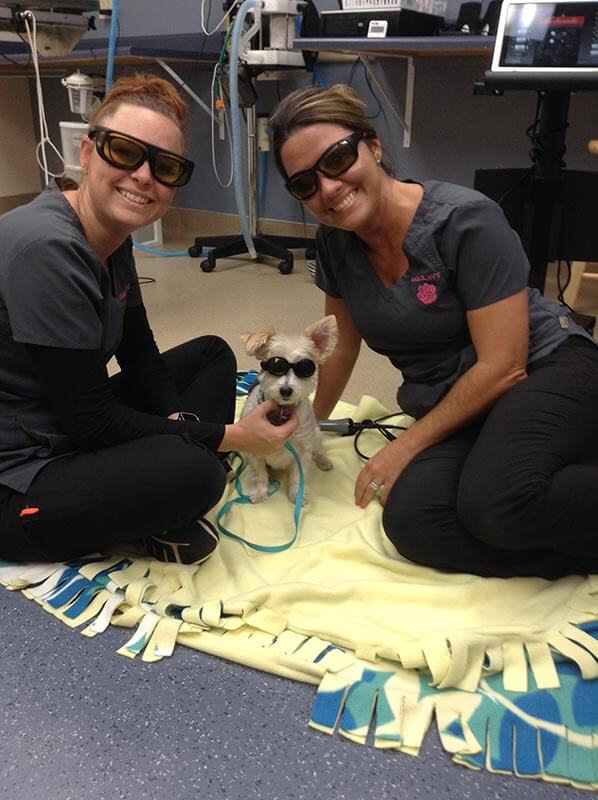
Cold laser therapy is a non-invasive, pain-free arthritis treatment that uses focused light beams to help repair damaged tissue. At specific wavelengths, light waves trigger cell division, growth, and repair. This process helps release endorphins, increase blood flow to the affected area, decrease inflammation, relax the muscles, and slow down the progress of the disease.
During cold laser therapy, one of our team members will use a special wand to beam focused light into the affected area. This procedure takes between 15 and 30 minutes to complete. Many pets find laser therapy relaxing—and there’s no shaving or sedation involved. Do you think your pet could benefit from Laser Therapy for arthritis? Reach out to our team to learn more.
Osteoarthritis in Cats
Many cats develop degenerative joint disease (arthritis) as they get older, but many are undiagnosed. We often are not walking our cats or playing fetch with them like their canine counterparts, so it may be difficult to spot the subtle signs associated with joint pain. Furthermore, due to stress, cats often do not like to move around the exam room much or are very tense and reactive for orthopedic veterinarians. You can be the best advocate by watching your cat at home when they are relaxed and looking for these signs: hesitancy or taking longer than normal to prepare to jump up on to furniture, taking longer to get up or down stairs, choosing to rest all day instead of being interactive.
For video demonstrations and more signs to look for, check out this helpful website: www.zoetispetcare.com/checklist/osteoarthritis-checklist-cat
General information about arthritis: catfriendly.com/feline-diseases/degenerative-joint-disease-arthritis/
If your cat is experiencing some of these symptoms, talk to your veterinarian about what we can do to help. There are newer, safer treatment options to provide pain relief and increased mobility.
Summary
With weight control, controlled and moderate exercise, Omega-3 supplements, nutraceuticals, and (with or without) anti-inflammatory drugs, many dogs can have their osteoarthritis pain controlled for several years.
We will be happy to work with you to find the best approach to manage your pet’s pain. Please contact us for a consultation.


